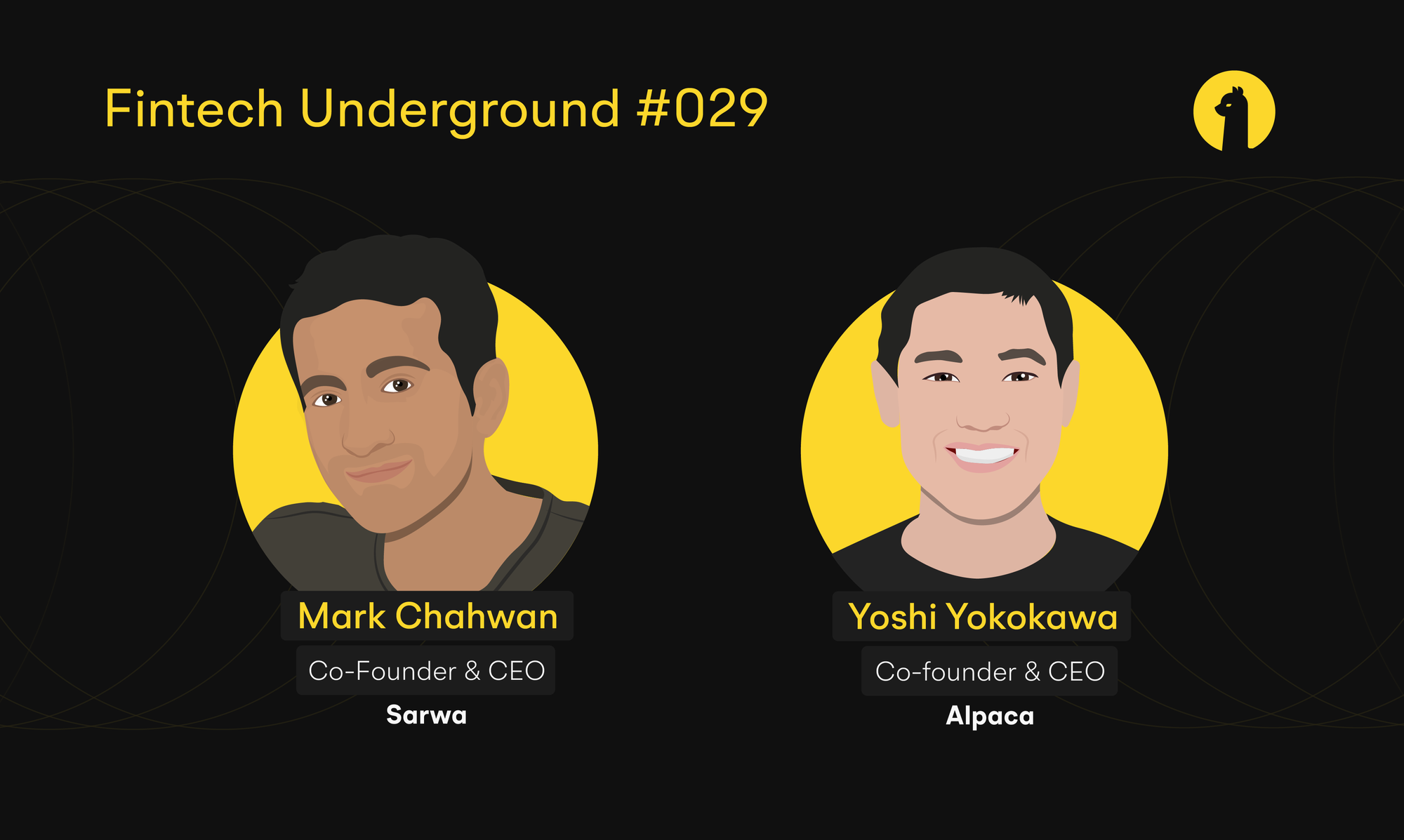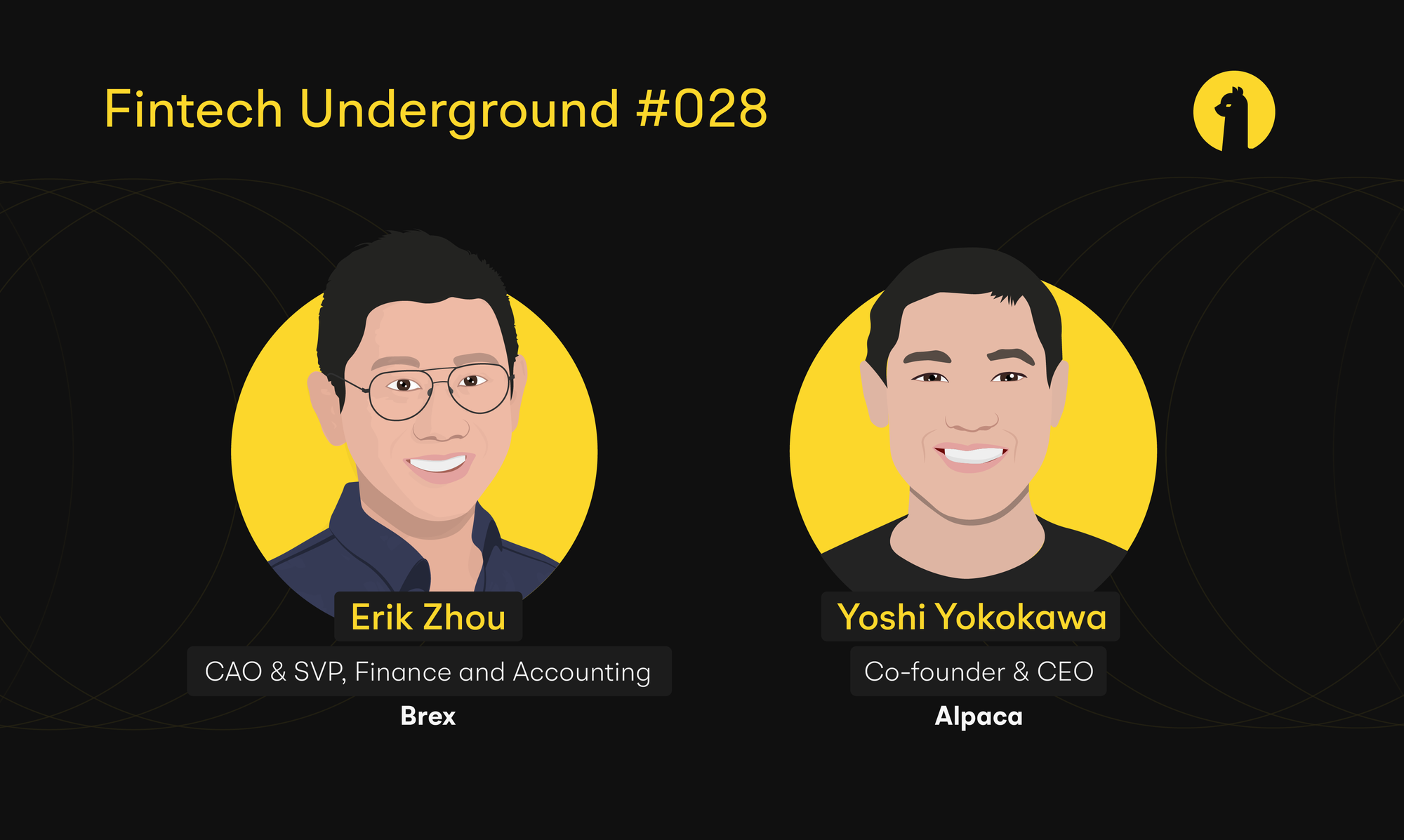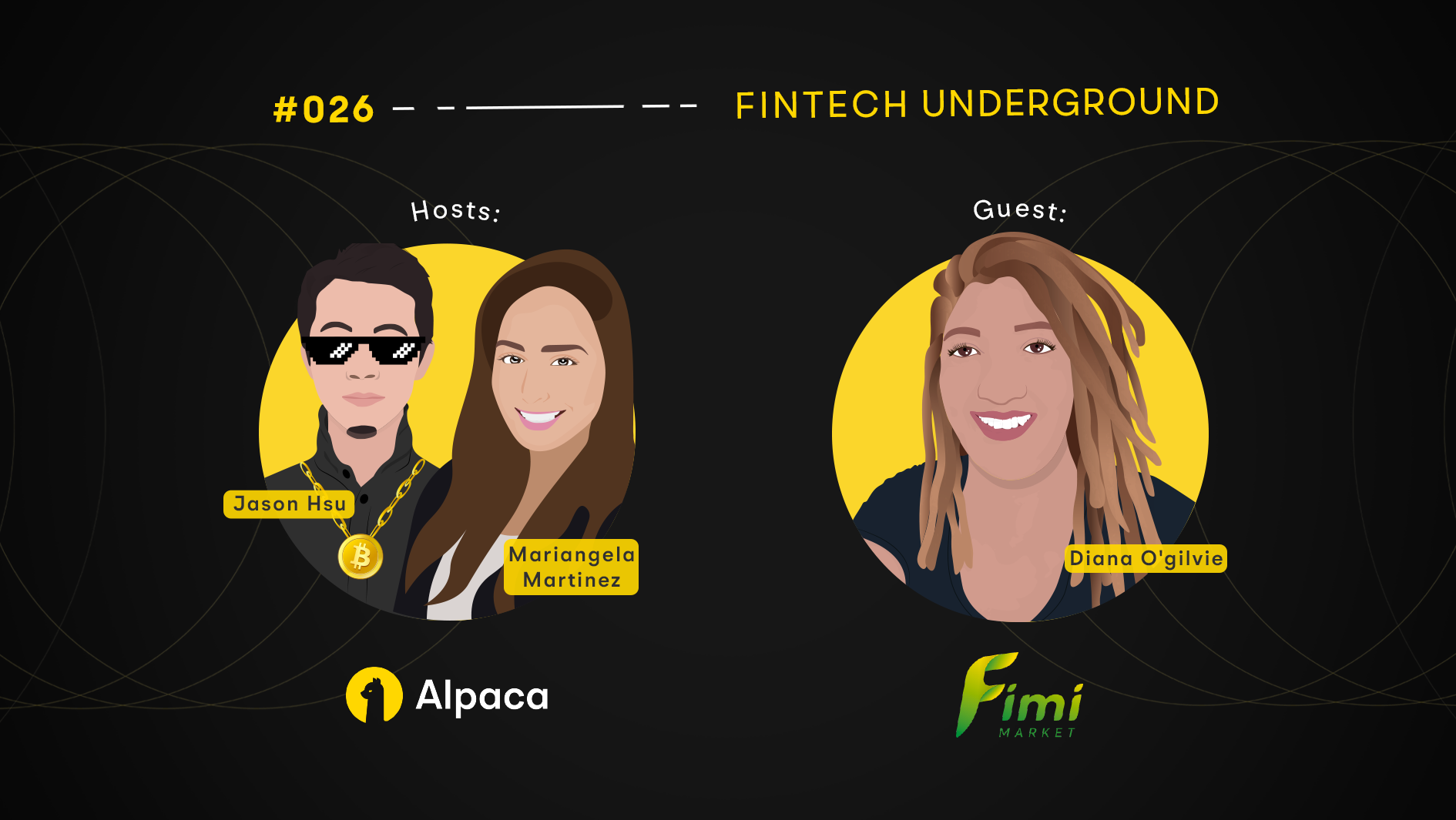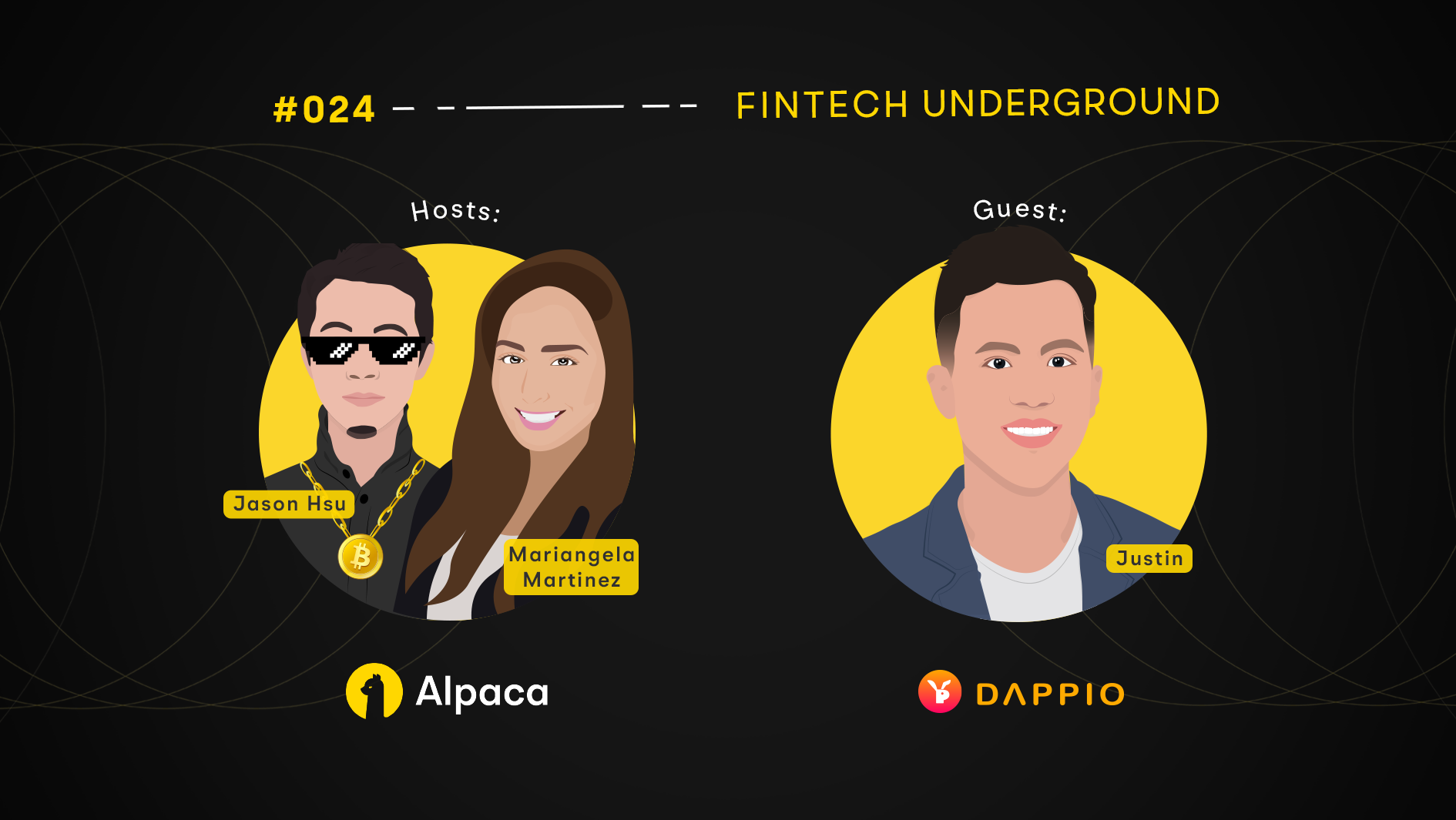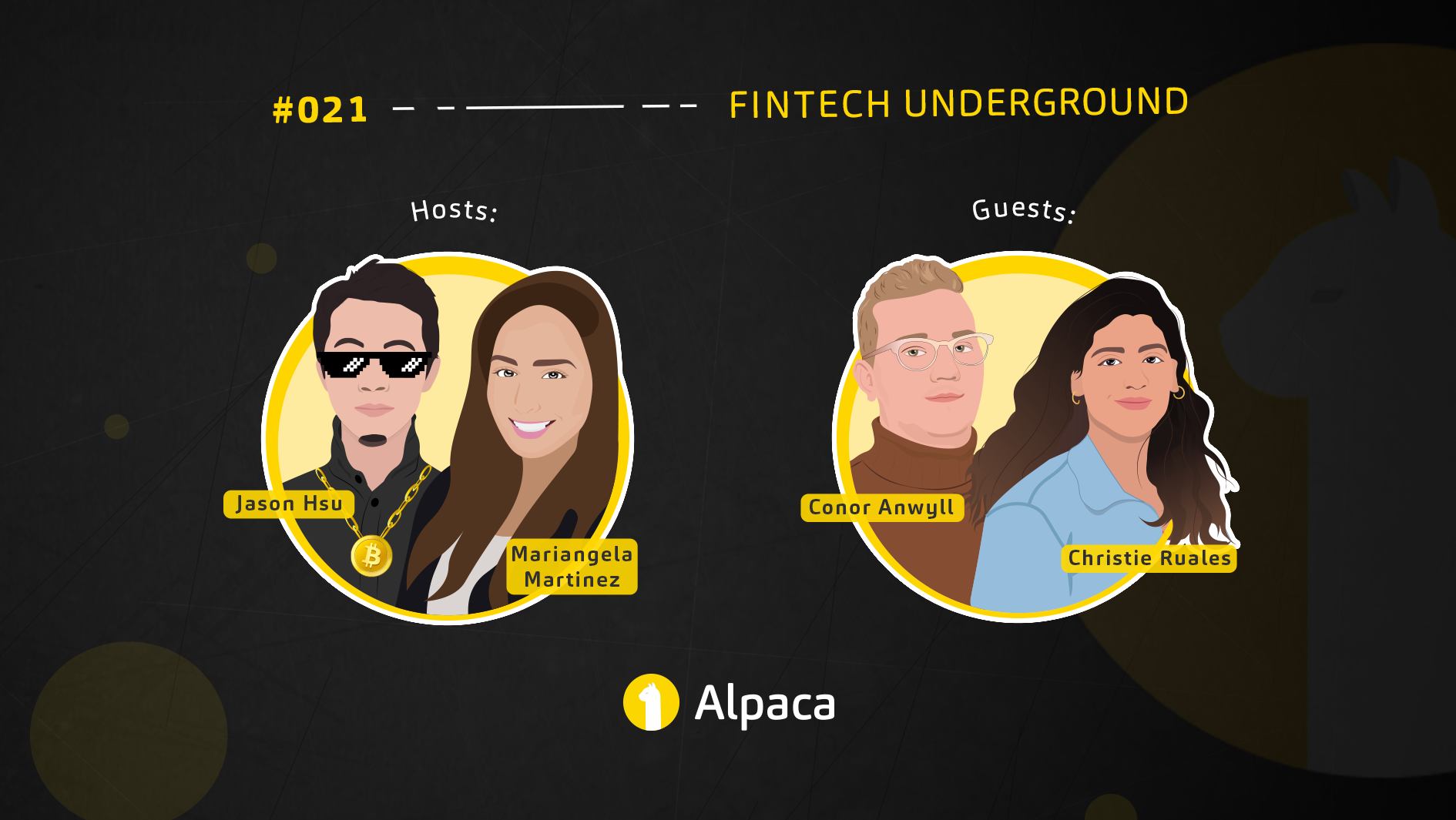
All views and opinions expressed by the guest speakers are solely their views and opinions and do not reflect or represent the views and opinions of Alpaca Securities LLC, Alpaca Crypto LLC, and AlpacaDB. The guest speakers' opinions are based on information they consider reliable and therefore Alpaca Securities LLC, Alpaca Crypto LLC, and AlpacaDB do not warrant its completeness, accuracy and it should not be relied upon as such.
The content is for general informational purposes only. Alpaca Securities LLC and Alpaca Crypto LLC do not recommend any specific investments, investment strategies or cryptocurrencies.
Fintech Underground by Alpaca is a podcast devoted to all topics related to stock trading and APIs. From trading with algorithms or connecting apps or building out services, we aim to bring light to the different corners of Fintech.

TL;DR
In episode 21 of Fintech Underground by Alpaca, we interviewed Christie Ruales, Product Manager at Alpaca, Conor Anwyll, Sales Director of Key Account at Alpaca, and Jason Hsu, Crypto Growth Manager at Alpaca. They all attended Consensus at Austin, TX this month and they share their insights to the event and to the recent fall of crypto.
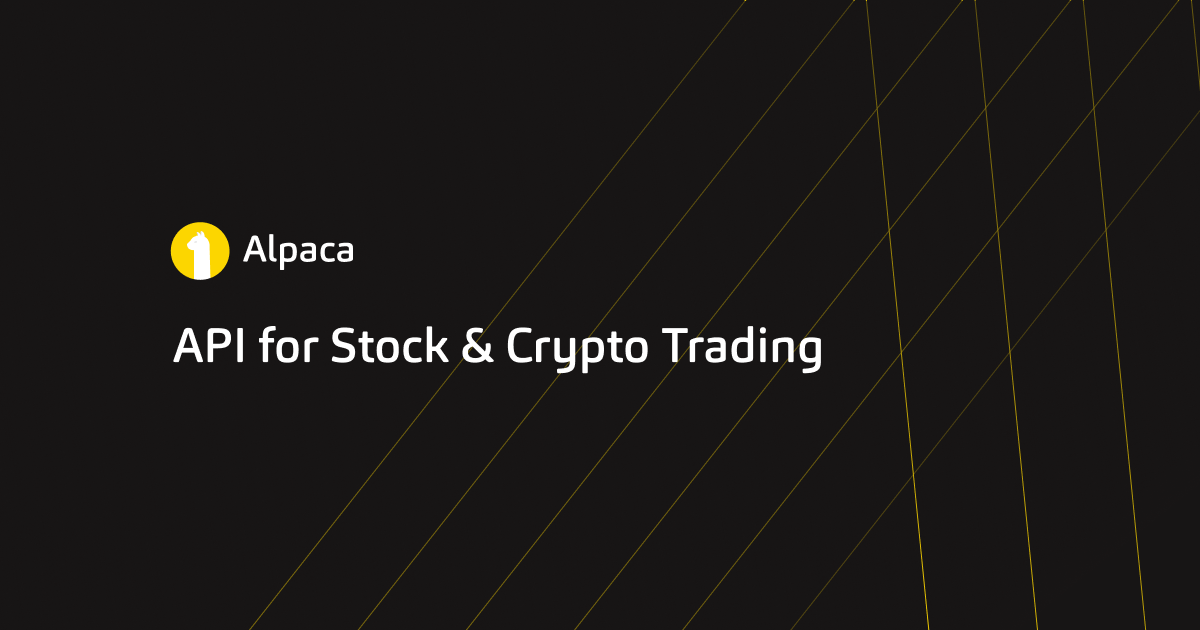
Find the full transcript below. To hear more of the most interesting Fintech companies speak about their experience in the industry, check out our other episodes below.
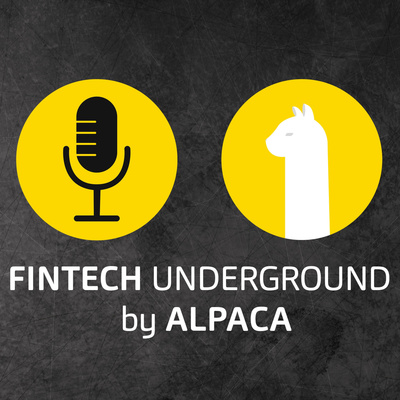
Full Transcript
Mariangela: Alpaca is a developer-first startup focused on building open APIs for stock and crypto trading, investing, and embedding. You can learn more by visiting our website at alpaca.markets. You can also find us on Twitter @AlpacaWeb3 or join our discord community also with the invite link @AlpacaWeb3.
Hello, I'm Mariangela Martinez, Content Marketing Specialist at Alpaca and Jason Hsu usually co-hosts with me, but he was a guest at Consensus Austin, which is what today's podcast is about, so he's joining us today as a podcast guest. He is a Crypto Growth Manager at Alpaca, and he did an amazing job this past weekend at Consensus with an Alpaca event that consisted of having alpacas. And he will tell us more about it in a little bit.
We have Christy Ruales, Product Manager at Alpaca. She graduated about a year ago from University of Florida with a degree in Computer Science, as well as experience in product management and founder of two platforms. But we'll leave it to her to tell us more about it.
Last but not least, we have Connor Anwyll, Sales Director of Key Accounts at Alpaca. He has extensive experience as an account executive at various companies and as an investment associate before joining Alpaca.
Any topic talked about in this podcast is not financial investment and/or tax advice. We encourage our listeners to seek individual advice should they deem it necessary.
So before diving into Consensus questions, Christie, can you tell us more about the platforms you founded and co-founded and what made you start them?
Christie: Yeah, sure. So I worked on this back in college. I joined this one program right when COVID actually first hit and it was just kind of for students that had their internships, you know, lost or revoked due to COVID. And so we were just looking for something to do over the summer, something to work on. So it just really connected us with other students, and we just pretty much decided what we wanted to work on. So I met a couple other people, really great people and really smart. And we decided to work on this project, essentially to build a online learning platform, specifically targeted for students in low income areas and students that don't necessarily have access to online learning platforms, which was, you know, now essential during COVID. So we were targeting schools in the US in low income districts and, you know, even countries outside of the US, and how to leverage, you know, learning it online in different languages and managing different platforms and kind of having a one stop shop for a place to go during school and facilitate that learning process.
So that was one of the, the platforms that I co-founded. And then I also founded this other, it was more of a passion project of mine during college, for my senior project actually, I built a platform to essentially target young age college-aged woman to connect them with each other and specifically for the needs of mental health.
So it was just something that I was passionate about, was super interested in, and I just really enjoyed the process of, I did everything from, actually building out the platform, being the software engineer, back end, front end, building all that out, doing the product work, the market research, you know, UX research, all that kind of stuff.
So those are kind of two of the platforms that I founded and really enjoyed working on. And now I'm here at Alpaca working as a product manager.
Mariangela: Cool. That gave you a lot of extensive knowledge building two platforms. I'm glad you did. It sounds very cool. Jason, tell us about the alpacas event and the proof of participation NFTs. I heard it was a complete success.
Jason: Dang. I just wanna say like Christie is a really smooth talker. I feel like my mind is still mush from our Consensus conference. Yeah, our alpaca event was at a real life alpaca farm. So like small correction, the consensus conference was from like Thursday to Sunday. There was another conference called Dcentral con two days prior to Consensus and we had our real life alpaca farm event on Wednesday on the eighth. And our initial capacity was like 50 people only, but shout out to our friends at KuCoin, KuCoin community chain, KuCoin labs, and KuCoin ventures. They came to cosponsor the event. So we were able to double that capacity and it was a little out there. Most side events were maybe within 5 to 10 minute walking distance from the main convention center, but ours, because you weren't gonna find a farm near the main convention. It's like a, almost a 30 minute drive from the main event.
But turnout it was great. We did have over a hundred people show up. We kind of accounted for that. So like we had over 300 signups and then we cut it off there. We don't want too many people showing up either.
And we also had an NFT project called Conscious Cups and they provided these Kratom, like these herbal interesting drinks. People got a slight buzz off of it. Conor can probably comment on that later. And we also featured some art from another NFT project called Alpacadabraz. We ran a contest and five other community members would have their NFT art featured.
Yeah, good variety of people showed up and your other part of the question was on the proof of participation NFTs. So they were actually released on a protocol called POAP and it's the proof of attendance protocol. I first got exposed to them last year at various conferences. I think Axelar was the network that first issued, well I got my first POAP from them and I was like, wow, like this is pretty elaborate, pretty cool concept. And unlike NFTs on Ethereum, there's no gas fee to mint 'cus it's on a side chain called xDai and I looked into it. I feel like we should, for branding purposes and be like, "Hey, Alpaca is cool and hip." And like our purpose of going to Consensus is to tell everyone in web3 that we're in this space now and being able to issue those is kind of attest to that. And, yeah, we were able to give some of these out.
Mariangela: So, okay. I have two questions. How did you find the farm and how did you get a hundred people to sign up?
Jason: Right, right. So the farm, I have a friend who helps organize Dcentral con. And so she's like, well connected in web3 space. And I think she's just knew the farm owner and through her, like after telling her, "Hey, I've moved on from my previous company and I'm in Alpaca now". And she's like, "oh, that's perfect 'cus there's an alpaca farm somewhat near the main event". And she just kind of intro-ed us. Sorry what was your other question?
Mariangela: How did you get a hundred people to sign up?
Jason: Oh right, so a lot of social promotions getting like the main organizer of Consensus like CoinDesk and Dcentral con helped promote our event.
Another thing to mention is like, I'm pretty sure we had like the lowest budget to work with. In terms of like hosting a side event. And this one wouldn't have been possible if consensus was in New York this year like every other year 'cuz there would not be a farm here.
So it's like, but it is a very unique event and so a lot of social shares and I had some.. I was in private groups in web3 of just like my friends and their friends. It's like a couple hundred people. And then I don't even, we had a password for our event 'cus we wanna prioritize while our friends in the industry and of course just people we want to invite to the event, but our password just gets leaked, like really quick. I knew it was gonna happen and, and I'm not complaining about it, but yeah, all our signups and spots were filled out. Filled out pretty quickly.
Mariangela: Cool. Yeah. That's doubled the idea to get people there. 50 people that's a lot.
Jason: Oh no, no. So our capacity at the end was like a hundred. And we could contain up to a hundred. And then I was like, okay, well, it's kind of out there. So we could probably allow up to like 300 signups and people were gonna realize, "oh, it's kind of far" and then drop out or, yeah. Yeah. Yeah. So we kinda accounted for that. I had some other friends who were hosting other side events and they would ask me, "Hey, we have our event at this hotel nearby and we got 200 for capacity. Like how many tickets should we be selling?" And I would say like, "you always oversell a little bit, but if it's like near the convention center, I wouldn't oversell as much," 'cuz it's like easy access and people wanna like party hop. Yeah.
Mariangela: Right. Yeah. Wow. That was a success for sure. Connor, how were the drinks?
Conor: The Kratom drinks were really good actually. They tasted a lot like melon and they had like kind of a spicy rim to it. So definitely better than what I was expecting. People were kind of telling me that it was kind of gross. And I'd never heard of it before. So an interesting experience to say the least.
Mariangela: Yeah. I've never tried, so, sounds interesting though. So what about the heat, Austin heat? I heard from Crest, Director of Marketing at Alpaca, that it was so hot that if you got out of like a, like those buildings, that it was extremely ridiculous. So I know Connor lives in Vancouver. So how was your experience with the Austin heat? Was it bearable?
Conor: Yeah, it was definitely difficult, to say the least, I enjoy my temperate climate out here in Vancouver, which is about 15 degrees Celsius. And I think every day we were in Austin at one point in the day, it hit like at least 40 degrees Celsius. So, yeah, definitely a bit of a shock for me.
I found getting out of the hotel early in the morning when the sun like wasn't fully in the sky yet, you could sort of sneak around in the shade. And it was okay cause it's a dry heat. But you know, in the middle of the day, or like even in the evening when that sun is in the middle of the sky it was definitely difficult, it definitely got to me a few days. But came back, no sunburns. So you know, not the worst thing in the world.
Mariangela: Yeah. Wow. I did college in Texas and when I first moved there, oh my God, I would walk to one class and I'd be sweating already. It was crazy. So what about you, Jason?
Jason: Well, I was born in Taiwan, and the heat there, it gets up to like, maybe not 40, but maybe 38 celsius in the summer. And it's a different kind of gross, like Conor was mentioning, it's like dry heat, but over there it's like really humid. But I forgot about that. I haven't been back home in years and, yeah, had to run to buy some sunscreen at the CVS right after I landed. But for the most part we stayed indoor. The unbearable part was kind of moving between side events and I guess getting to the convention center. Yeah.
Mariangela: Yeah. Wait, how was with the farm?
Jason: The farm wasn't as bad cuz it started at six to eight, and at six it was still kind of hot. But we had the farm owner. He put this, I guess, sprinklers on, and it was effective I guess. Yeah.
Mariangela: Yeah. That's nice, poor animals if it was 40 degrees. Christie, are you used to that heat or was it like a shock as well?
Christie: My family lives in Florida now. So it's just like, the dry heat I think is more bearable than the humid heat. I hate the humidity, so it wasn't so bad for me. Yeah.
Mariangela: I agree. Yeah. And I feel like our bodies get used to like where we're living. So I don't know, like I lived in Minnesota and then moving to Texas was ridiculous. And then like now I'm in Mexico city and it's like colder. So if I go to Texas it'd be like death for me right now. So it's just like, I don't know, we get used to it, I guess.
Christie: Yeah. I also grew up in Minnesota and then moved to Florida. So it was like the same thing. Just unbearable.
Mariangela: Oh my God. Wait, you live in Min. So Christie did a semester abroad in Madrid and me too. It's funny. Like we have a lot of things in common.
Christie: Yeah. Yeah. Cool.
Mariangela: Yeah. We need to talk more about that later, off the podcast.
Christie: Yeah. I'm living in Santiago right now. So it's winter down here. So the adjustment going back to Texas was rough.
Mariangela: Yeah, I bet. Okay, so let's go into Consensus questions. So I wanna hear from the three of you your experience, so was it your first Consensus? And was it what you were expecting? Let's start with you, Jason.
Jason: It actually is my first, was my first Consensus. I wanted to go in previous years, I think starting 2020, but I think they just went virtual cause of COVID. And I think it's, well it's everyone's first Consensus in Austin cuz this is the first year they've they've moved it there. And I believe from what I've been told, that every following year it's gonna be there, just cuz it is cheaper to host it there and they can contain more attendees.
But I've been to a lot of other conferences, like Mainnet, Dcentral con, BTC Miami, and it's kind of what I've expected. It's a little more corporate, but it's one to go to, like if you had to pick one for the year, this would be it. And, I think it was important for us to have a presence there. And all the side events were really exciting too.
Mariangela: Yeah. Is it one of like your top events or would you have like, not really as like your best one?
Jason: Out of all the ones I've been to, it's up there. I mean there's more business involved. I think Dcentral con is definitely quite fun. I mean, there's more like GameFi and NFT projects there, but it's not, those are much more early projects. Like you might not see them next year around. But Consensus, you see some really big names, year after year, same big players in the space. Obviously Celsius is having some issues right now. But I believe like, yeah, they showed up every other year.
Mariangela: Okay. Conor, was it, well I guess it was your first one, was it what you were expecting if you've been to other events?
Conor: Yeah, it kind of blew my expectations out of the water, to be honest I wasn't expecting nearly as many, like Jason alluded to some of the, like really bigger names, like Binance, things like that were all over the place. So it was pretty cool to see all of those different booths as well as to see just like the sheer number of people attending the conference, that really surprised me as well, felt like it was always packed, it was always busy and there was always people at our booth, just learning more and trying to get their hands on some of the pretty sweet alpaca tees.
Mariangela: Cool. What about you Christie?
Christie: Yeah. So this was my first Consensus and my first crypto conference as well. So it was definitely interesting. I was a little bit surprised by how business focused it was, I guess, I feel like there was, a lot of the people that I was meeting was, you know, sales people and discussing their product and trying to sell you something. And so I was really interested in, like, I wanted to get more involved, I guess, in the dev community side of things and kind of, I was trying to go to all the sessions, you know, the speaking sessions that I could and just learn more about web3 and exciting stuff that's going on in the community right now.
Mariangela: Okay. So how do you think the networking was? Did you go with any networking goals in mind or did you just like go in and see what it had [to offer]?
Christie: Yeah. I guess I didn't really have any strong networking goals in mind. I think the goal on Alpaca side was definitely to do product education and meet new people that were interested in using our products and stuff like that. So that was definitely what we accomplished just from the booth alone, the sheer amount of people that came to the booth and were interested in learning more. And once they did, they were like, "oh, this is the perfect product for me to incorporate into my existing app," or "how can I get started in using your products" and stuff like that. So I think we definitely achieved that goal there. But on a personal note, I didn't really have any specific goals in mind.
Mariangela: Okay, and did you meet anyone that wowed you that you weren't like expecting to meet?
Christie: So I didn't meet him, I actually went to the speaking session with Edward Snowden. So he called in from Russia, he wasn't physically there. But that was super cool. I've always, I think, looked up to him in a way. So it was really cool just hearing him speak, just getting his direct thoughts on the crypto community. And he was talking specifically about privacy concerns there. So that was really interesting. And then also the author, Neil Stephenson, was there. I don't know if you guys are familiar with him, but he wrote the book Snow Crash back in the eighties, I think maybe nineties, and essentially coined the term metaverse. So he's just a really big person in the developer community. So it was really cool seeing him there in person.
Mariangela: Yeah. Was it like hard to like meet speakers? Or was there like a way to get to know them, talk to them personally, one-on-one?
Christie: I think after the speaking sessions, they would just kind of hang around and people could go up and talk to them and take pictures if they wanted to. I didn't but I think it was pretty easy access to them I would say.
Mariangela: Yeah. It gets a little bit crazy once the speakers are done, like people just go around them and it's really hard.
Christie: Yeah, exactly. I didn't wanna be one of those people.
Mariangela: So would you say those two were your favorite workshops and talks?
Christie: Yeah. I went to quite a few. It was really interesting. I went to one on the path to financial inclusion in Latin America, and that was really interesting. My family's from Latin America, so it was definitely really interesting to get the perspective, and kind of how web3 can step in there and help make a difference.
Mariangela: Oh, cool. Yeah, that sounds interesting. Nice. Okay, so, Conor, tell me about your networking. Did you have any networking goals in mind before attending?
Conor: I think our goal really was to just really gauge interest of the market. See who knew about Alpaca and then educate those who didn't. So, personally I wanted to grab about 25 or so really good contacts just within the industry and just different brands all over the world because we work with international partners. I think I came out of Consensus with about 40 or 50 new contacts and connections just through Telegram as well as LinkedIn. So it was definitely really productive and it was really cool to see all the different brands approaching us just out of interest and from hearing about Alpaca and what we're doing with other partners in the market.
Mariangela: And out of those like 50 people that you connected with, who wowed you that you weren't expecting to meet.
Conor: Yeah. We met a ton of pretty cool individuals. Some from eToro, some from our investment network. So there was, it was sort of like a who's who, definitely don't want to spill too many of the people reaching out to us just before we have our contracts or NDAs in place or anything like that.
Mariangela: Right.
Conor: But it was definitely an interesting event to really meet some of the bigger players and potential partners in the market.
Mariangela: Okay. I'm excited to learn more about it off the podcast. So what was your favorite workshop or talk that you went to and why?
Conor: Yeah. I would say there were a couple really good ones that I enjoyed. I was at the dividends one on the first day, that was really educational, really good to understand how they work, and how the market is trending and what people need and where Alpaca fits in on that. So definitely that. And then I heard rumblings of Jack Dorsey's speech being very good. And, you know, him talking about the possibility of introducing web5. So that's always pretty interesting when the former owner of Twitter has a new project in mind.
Mariangela: Were you able to go to that one?
Conor: No. Wasn't able to attend that one, was at the booth for that one.
Mariangela: Oh, okay. I see. Yeah, but I mean, you probably heard all about, it was probably the talk of the event.
Conor: Yeah, absolutely.
Mariangela: Yeah. Okay. Jason, so you go to a lot of conferences, so you probably know a lot of people, and I'm guessing you saw people that you already knew, but how was the networking besides the people that you already knew? And if you had any goals in mind before attending.
Jason: Yeah. There were definitely old friends at this conference, that's how we get access to some of the parties. On the sales side, I think Conor definitely exceeded the goals we had for him. On our marketing side. I think generally it's like, again for branding for Alpaca, like this is a year that we've poured a lot of resources into going crypto centric and building out our crypto offerings. So to kind of be in line and at the same place with these other brands and companies that have been in crypto for years and introducing ourselves to them as a, maybe not fully web 3.0 company, but like 2.5, getting there and just discussing ways of like how we can potentially work together, it was pretty productive. Yeah.
Someone, I wouldn't say there's anyone that like wowed me, but 2 Chainz was there. I'm sad I didn't get to meet him cause like all my social handles are twoblockchainz, so it would've been good to have a picture with him. That would've been my PFP for the week. And, yeah, I guess it's a little unfortunate that, I mean, now we know where some of our product people engineers interest lies, like for Christie, it would be good to like have her go to like the Eth and like DeFi meetups where it's a little more dev focused. But it's like our first big sponsored event that Alpaca has participated in.
What was interesting though, was like at the Chainlink party, I would meet these Solana devs because for some reason this time around, or maybe it ended early, like usually at these main conferences in New York and Miami, there's like a Solana hacker house nearby. But I don't think it was happening during Consensus, there might have been like ATX DAO, DeveloperDAO side events, but it's pretty far from the main convention center. But I still met up with some devs and heard like what they were working on. And it gave me some product ideas to like what we can kind of create and help these devs build in web3, cause that's our audience, right? Like devs and people who have a little bit of technical capabilities.
Mariangela: And was it in the event or at the after parties?
Jason: Oh, these would be mostly at the after parties, I think on the main floor, our people are just, there's just so much traffic, people are just lining up to talk to us. And in full transparency, I would say like the majority of the people did not know that we're offering crypto or what Alpaca is, or like they confuse us with, other like Alpaca finance, other Alpaca named web3 projects. But they're excited to learn like what we're working on and how we can like, sort of build together.
Mariangela: I'm glad there were people lining up to talk to us and get to know us.
Jason: Yeah. Yeah. I think we just picked a good brand name and logo, people were just like, "wow," and we made it simple. Like our booth was just one big Alpaca logo. And then, so people would just come up to us and be like, "I like your logo. What are you doing?" So it was effective. Yeah.
Mariangela: That's cool. Yeah, smart. So, okay, tell me more about the after parties. I wanna know everything.
Jason: Yeah. Some of them were more elaborate than the others and they all had, I keep stressing this cause I wanna get more budget for our next event, they all had more, they definitely put a lot more money. Like my previous company held, had their after party at The W and I think they messed up somewhere. Their capacity was like 400 and they had over 5k signups. So people couldn't get in and they probably ended up having to pay double on their tab for letting maybe more than a thousand people in.
What else was there? One party I wanted to go to had the table tennis. So I think that's, Conor, you guys were able to go to that one. The lineups were just too long. I went to Compound's side event and I met their founder and we were just talking about.. I didn't recognize him at first, and we were talking about, I guess BlockFi, their stability he had some, I don't wanna say insider knowledge, but some insights. And apparently he also worked on our series A pitch deck so he knew Yoshi pretty well. And we were just talking like Twitter strategies and how he could use an intern for his Twitter, even though he has, he's like verified with like 100K followers. And he just tweeted on the spot that he's hiring for an intern, but he wasn't gonna pay anything, except with good vibes. And, yeah, he had really good engagement though. Interesting people. I'm still trying to collect my thoughts and all the context I've gathered on Telegram.
Mariangela: Wow. I mean, yeah, the after party is a good place to go. Let's see. What about you Christie, did you go to any?
Christie: Yeah, I went to a couple. We had this, Jason and I went to this, private dinner by hosted by Tatum. That was, it was at Fogo de Chao, so it was like a steakhouse and just pretty much unlimited food. So got, you know, super full and just ate my heart out there. There was-
Mariangela: Wait, was it that the Proof of Steak one or not?
Christie: No, no, it wasn't that one. Yeah.
Mariangela: Oh, I see.
Christie: But, yeah, there was also the Elysium CarrotDAO event. I ended up getting there as they were wrapping up, but earlier in the night they had like a, you could feed bunnies like carrots cause their name is CarrotDAO. I'm sad I missed that, but yeah, I just went to a couple other like networking events. It was it nothing too crazy.
Jason: Wait, I saw the bunny, but no one was feeding it anything. I actually owned a bunny at one point, it's not good to feed them carrots actually cause it's not too much water inside. It gives them diarrhea or something.
Christie: I saw they, I think they posted a picture of like someone feeding it. I don't know if it was a carrot. Maybe it was something else. I hope it was.
Jason: Okay. Okay. Yeah. And the Proof of Steak dinner, I don't think any of us went to that one, but it's a paid very organized event. Not that ours wasn't, but we currently work with Tatum to offer our wallet features and it was more of a private thing and they invited us there. It was great.
Mariangela: Yeah. Conor, did you go to any, well, you did, right? The table of tennis one or something.
Conor: Yeah. I went to the table tennis one. That was a lot of fun. I'm not very good at table tennis. And I'm pretty sure Jeff, the VP of Sales, beat me a couple times, but definitely didn't put my name in the tournament. I knew better than that.
Mariangela: Yeah. Maybe with a couple of drinks you'd get better. .
Conor: I think it's pretty likely the opposite would happen. So we just chatted. We watched some of the games go down, met some pretty cool people. But overall was more of a spectator than a competitor for that party.
Jason: Were there prizes? For winning the tournament?
Conor: I'm not sure I didn't stick around the entire night to see what happened.
Jason: Gotcha. Yeah. Just reminded me of these.. there's this other private whale party. And I'm not a whale. So don't dox me. Even though my information's pretty public, but I was invited to go there and I was, I also played spectator cause there was just some really high stake poker games going, it's like 10-20 ETH.
Mariangela: Oh, wow.
Jason: Yeah. I'm not playing that. I left pretty quickly.
Mariangela: Yeah.
Jason: But it's like people keep a low profile there. Interesting setup. Just at a hotel room. Yeah.
Mariangela: Wow. That's a lot of money to pay for.. I don't know.
Jason: Yeah.
Mariangela: Okay. So I wanna talk a little bit about crypto. So let's see, has the fall of Terra changed the way you measure your investment risk in crypto? And I mentioned Terra, but you know, this week has been basically a bloodbath for many people, either stocks or crypto. So, what do you think, Jason?
Jason: Oh, not at all. I'm still all in on like a bunch of, no, no.. I'm just kidding. Yeah, definitely I was affected by the Terra/Luna/UST crash. I didn't have too much in Luna. But I did, I thought, and many people in the industry also thought that UST was relatively stable as it was marketed.
But, you know, during the de-peg, I think speculators, and it's not officially confirmed, but even if I were like Do Kwon or the Terra Labs, they reached out to, cause like what's happening to 3AC right now, or even Celsius, like next they'll reach out to bailout Celsius, but apparently they refused, according to Nexo.
There's just, yeah, 3AC is currently seeking bailouts from other funds. But Luna couldn't really do that because it was just falling too quickly. You know, things were like, they would offer something like: you could buy Luna right now at 50% of the price. But it would be locked up for a year, but you would lose like 80% in a day. So no one was gonna catch that falling knife, but you know, shortly after that downfall, Justin Son from Tron came out with another stablecoin that's also algorithmic. And so it's, I don't know, I'm a little scared. I mean, the mechanics are different. But I'm not touching that for now when it's offering even higher APYs and this week it's de-pegged but it's not tied to TRX, the Tron token. But everyone's just speculating. The Celsius and 3AC stuff, this week that's pretty huge. So there might be another wave of effects coming.
Yeah, I don't know. I mean, it's.. I would, on the safe side, you know, you could just go to stables and then play with just guaranteed lending and borrowing rates that's still, you know, better than traditional finance markets, like what you would earn on your interests. But it's really new. I mean like the algo-stablecoin crash was unprecedented. I wanna say, I mean, there was like IRON finance and like similar projects that Do Kwon personally himself also was part of. But it was a much smaller scale and they were able to kind of bounce back in the end. But this was, I mean, wiping out, what was it? 40 bill at market cap in like less than a week? That was just unheard of, yeah, like all these, if all these other stablecoins, we're all just closely monitoring right now, like if they all de-peg, then I think the whole crypto market would be in serious trouble.
Mariangela: Yeah. Was there talk about this at the event?
Jason: I'm sure there were murmurs, but I don't think this is being discussed on stage. I think there might have been one or two sessions that I missed that was specifically on this. But at crypto conferences, like you would, sometimes you would feel like you're in a part of a bubble cause like everyone's working, most people are there to promote their products and services, where we're all like pro crypto. But I mean, one thing that's undeniable is crypto's here to stay. There's all these downturns and like some really huge crashes, but like the crash of Luna UST that just accelerates like regulations on stablecoins. When governments feel like these can be regulated and also means more people feel safer jumping into it. That's my take.
Mariangela: Okay. So you think it's positive, like better, that there's gonna be implementation on regulations?
Jason: Well, there's two sides of that. I mean, people in DeFi obviously don't like regulations.
Mariangela: Right.
Jason: But US residents are already experiencing really limited options. When their assets are being tracked and the IRS wants to tax them on crypto gains. And there should be I think some protection on the stablecoins.
There's pros and cons to having government involved. You get a little more insurance. Cause I know people will put their life savings into UST thinking well it's marketed as a stablecoin and now they're at risk losing their house, their family, things like that. But government and regulations are reactive. So it's, if these things that were in place, or the next stablecoin, if there was another stablecoin crash comes around, we would not have people committing suicide over this.
Mariangela: Yeah. Christie, what is your position on trading platforms that block trading when coins or stocks are crashing? Not gonna name any platforms.
Christie: Yeah. Yeah. I feel like this is definitely a little bit of a controversial topic. And I think there is, I'm definitely not well versed enough in the regulatory or compliance, I guess, needs that are probably driving these decisions. But I mean, speaking from like a product perspective, I feel like it's you know, those platforms that are disabling the ability to withdraw funds and withdraw the tokens that you hold is definitely not a great user experience. And everyone's kind of adding all of those hurdles to allow withdrawals and that kind of stuff. And I also get the other side where those institutions are coming from a place of wanting to protect our investors. I think in the past, especially in the securities market, which is a lot more well established, when that happens, I feel like that happens for, it's coming from a place of protecting Wall Street and protecting those significant whales, I guess, in the market. So it's something that I'm definitely a little bit skeptical of. But like I said before, I don't know exactly what is driving that decision from a regulatory/compliance perspective.
Mariangela: Yeah. Yeah. I agree. Conor, what are your thoughts?
Conor: Yeah, it's definitely pretty interesting. I've definitely taken notice to some of the changes, but on the sales side, we haven't really seen much of an impact in terms of interest or partners reaching out or partners trying to work with us on the crypto side.
Mariangela: Thank you. Thank you for that Conor. Is there anything else anyone would like to say?
Jason: I think we should be showing more presence at some of these events. But obviously budget is a limiting factor. We're a little late to the game to reserve a spot at Money20/20. But we wanna make it happen. Maybe we'll have a booth there. And so, we'll see you there.
Mariangela: I'm sure we will have a lot of those and it'll be great.
Thank you guys for joining the podcast. It was a pleasure having you here and thank you for sharing your insight.
To our listeners, check out Alpaca for more information about stock and crypto trading, and always remember to do research before investing.
The content and comments of this podcast should not be taken as Alpaca, providing investment legal and or tax advice. Every situation is different and you are encouraged to seek independent, legal and investment and or tax advice. Cryptocurrency is highly speculative in nature, involves a high degree of risks, such as volatile market price swings, market manipulation, flash crashes, and cybersecurity risks.
Cryptocurrency is not regulated or is slightly regulated in most countries. Cryptocurrency trading can lead to large, immediate and permanent loss of financial value. You should have appropriate knowledge and experience before engaging in cryptocurrency trading.
Securities brokerage services are provided by Alpaca Securities LLC ("Alpaca Securities"), member FINRA/SIPC, a wholly-owned subsidiary of AlpacaDB, Inc. Technology and services are offered by AlpacaDB, Inc.
Cryptocurrency services are made available by Alpaca Crypto LLC ("Alpaca Crypto"), a FinCEN registered money services business (NMLS # 2160858), and a wholly-owned subsidiary of AlpacaDB, Inc. Alpaca Crypto is not a member of SIPC or FINRA. Cryptocurrencies are not stocks and your cryptocurrency investments are not protected by either FDIC or SIPC. Depending on your location, cryptocurrency services may be provided by West Realm Shires Services, Inc., d/b/a FTX US (NMLS #1957771). Please see the Disclosure Library for more information.
This is not an offer, solicitation of an offer, or advice to buy or sell securities or cryptocurrencies, or open a brokerage account or cryptocurrency account in any jurisdiction where Alpaca Securities, Alpaca Crypto, or FTX US respectively, are not registered or licensed, as applicable.


